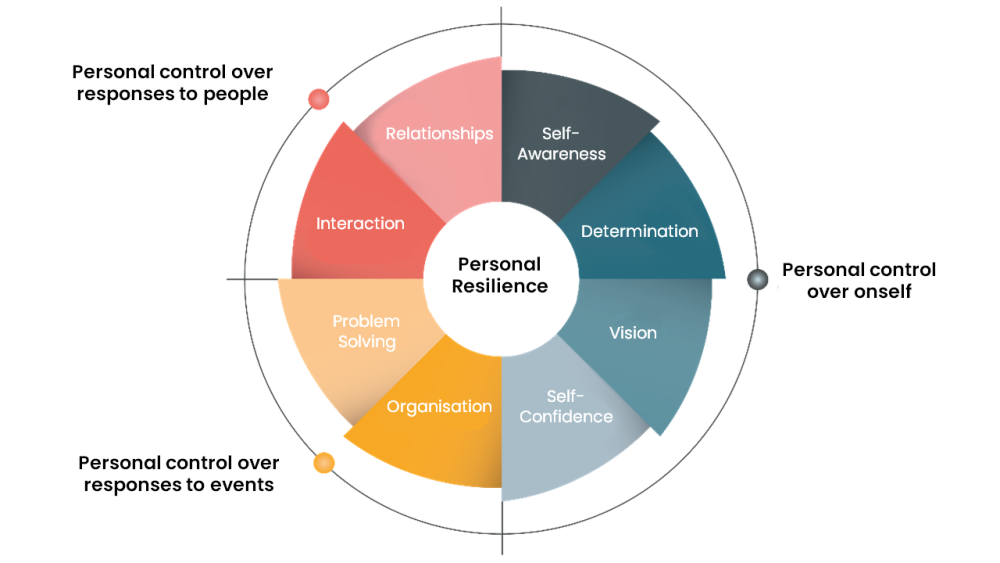Personal Resilience
Resilience is a key component in the primary prevention of stress at work. We all have a responsibility to be as resilient as possible against the uncertainties of everyday working lives.
Resilience is about our personal attitude towards work and the challenging events that take place in the working environment. My definition of resilience is
To overcome events and behaviours perceived to be extremely stressful without experiencing stress oneself.
Resilience, however, is a choice. You can decide to be resilient or not, depending on the answer to the question ‘what’s in it for me’? This question is posed (consciously or unconsciously) every time you come across a challenging event or difficult behaviour.
As the answer to ‘what’s in it for me?’ is often linked to a compulsion to survive to the next moment, you either decide to escape the situation and hope there are no consequences (passive resilience) or face up to the challenge and invoke your resilience (active resilience).
You can use passive resilience as protection against challenges that you know are too difficult, complicated or beyond your capacity, to deal with. You accept the situation and seek to carry on as normal without directly addressing the challenge. You neither escape the situation nor confront it. In effect, you hope that time will enable you to emerge again and lead your normal life without you having to think about ‘the monkey on your shoulder’.
Active resilience is a process of forming a robust attitude to a challenging event.
How do you strengthen personal resilience?
Some aspects of active resilience are personality dependent whilst others are skills determined.
All elements can be learnt and strengthened, although determination and an open mind are required to bring about the necessary change of habit and behaviour required to strengthen resilience.
Mental strength comes from knowing you have the capability, self-belief and mental capacity do something.
To strengthen resilience, you need to build your mental strength, and your capability to rise up to, and overcome, challenges, by learning techniques that will help impart understanding and improve your ability to choose resilience against challenging events wherever they arise. You need mental control, a positive attitude, motivation and have the energy to overcome the event.
The framework I use to help strengthen personal resilience is based on three aspects of personal control:
- Personal control over oneself
- Personal control over responses to events
- Personal control over responses to people
Within each of these groups there are a number of elements, eight in total (self-awareness, vision, determination, confidence, organisation, problem solving, interaction and relationships) which provide focus for individuals to strengthen their control – as shown in the following diagram.
Personal Resilience Development Framework
|
Self-awareness |
If you are aware of your own strengths and weaknesses, and know you have the inner capacity and capability to overcome many types of challenge, you can choose to be resilient. |
|
Determination |
Determination has a lot to do with knowing your core values, which are also your core drivers. If you know what drives you to take the decisions you take, you will have the tools to remain determined to see things through to a conclusion. When this happens your resilience against adverse events will be very strong. |
|
Vision |
If you have a reasonably good idea of what you want out of life, and what you want to do, you will have a focus that helps place other challenges in perspective. Having a longer term aspiration that you really, really want to achieve gives you the mental strength to drive you forward and over the bumps of everyday life. |
|
Self-confidence |
You boost your self-confidence by controlling your anxiety, for which there are many tried and tested techniques. This gives you the confidence to do anything you want. |
|
Organisation |
If you know you can organise yourself in a chaotic environment, you know you can deal with almost anything that’s thrown at you. For example, knowing how to arrange and successfully cope with a heavy workload will give you a sense of achievement and success which is like feeling a reward. Which will drive you on with the anticipation of feeling successful again when the next task is completed. |
|
Problem solving |
If you know you can solve different types of problems, you will have the flexibility, knowledge and confidence to tackle difficult and challenging events without feeling stressed by them. |
|
Interaction |
If you know how to persuade others to do what you want them to do without causing them any distress, you will know how to interact effectively with anyone, at any time, about anything, even those who are aggressive towards you. |
|
Relationships |
If you have strong relationships with others who are important to your success and happiness, you will know you can trust and rely on their support in difficult situations. This boosts your confidence; their advice helps your flexibility, and their encouragement helps your strength of mind. |
Resilience Assessment Questionnaire (RAQ 8)
Try this short Questionnaire based on the 8 elements and see how you score. You can download a PDF version of the qustionnaire via the link above. The full version of this Questionnaire – the RAQ 40 is used in the various MAS Resilience Programmes.
Please answer the following questions by circling the relevant number.
1 = Never, 5 = Yes, always
|
1 |
I usually know how others perceive me |
1 |
2 |
3 |
4 |
5 |
|
2 |
I am determined to achieve my lifetime ambitions |
1 |
2 |
3 |
4 |
5 |
|
3 |
I can see my future clearly |
1 |
2 |
3 |
4 |
5 |
|
4 |
I normally feel comfortable in new situations |
1 |
2 |
3 |
4 |
5 |
|
5 |
I plan my next day in advance |
1 |
2 |
3 |
4 |
5 |
|
6 |
I enjoy the challenge of unravelling puzzles and solving problems |
1 |
2 |
3 |
4 |
5 |
|
7 |
In general, I like people |
1 |
2 |
3 |
4 |
5 |
|
8 |
My most important relationships are my strongest |
1 |
2 |
3 |
4 |
5 |
Scores
|
1 Self awareness |
|
|
2 Determination |
|
|
3 Vision |
|
|
4 Self confidence |
|
|
5 Organisation |
|
|
6 Problem solving |
|
|
7 Interaction |
|
|
8 Relationships |
|
Any score of 3 and below indicates a need to strengthen this element of personal resilience.
Note to organisations
Organisations intending to embark on resilience training for their people should note that a Personal Resilience Programme can only go so far. They should not view a resilience programme in isolation, but as part of a transformation process to achieve peak performance throughout the organisation.
Without the elements of corporate resilience in place (supportive culture, great management and a working environment that aids psychological wellbeing), there comes a time when individuals are unable to cope effectively with certain challenges, no matter how robust their personal resilience may be.

This article and accompanying tips have been provided for FICM by leading psychologist Dr Derek Mowbray.
To find out more about Strengthening Organisational Resilience, read Derek ’s Guide to Organisational Resilience.
To find out more about in house programmes for Organisational Resilience, email barbara.leigh@mas.org.uk, or download a pdf of all our development programmes.
More information can be found in the MAS Article Library, or why not try the MAS Questionnaires.
Want to know more?
Browse our Resilience resources.


